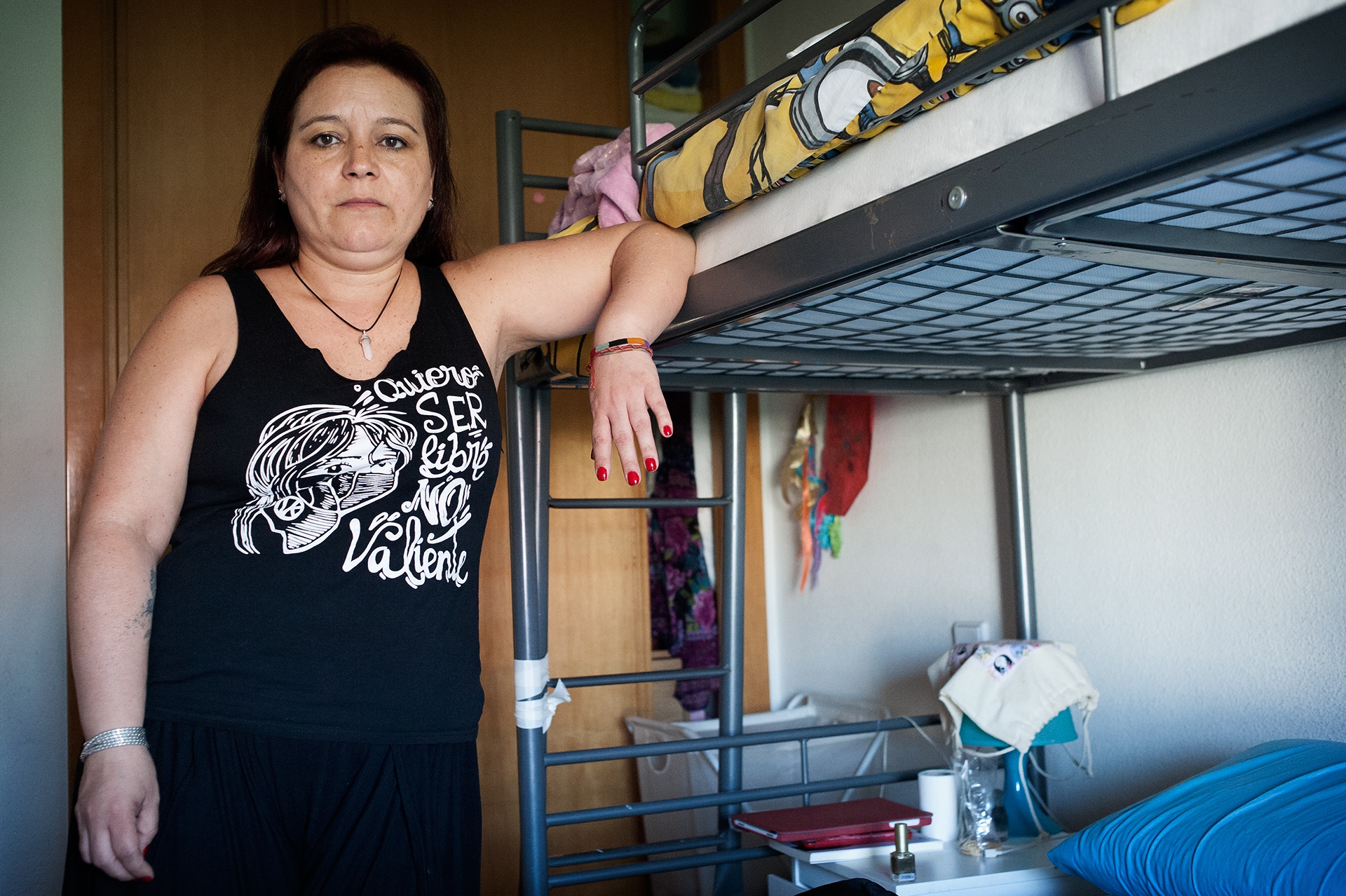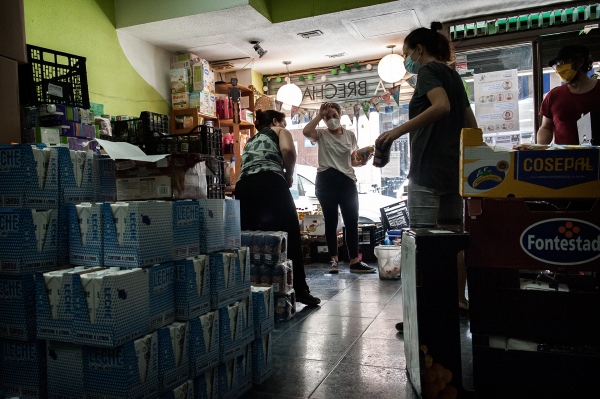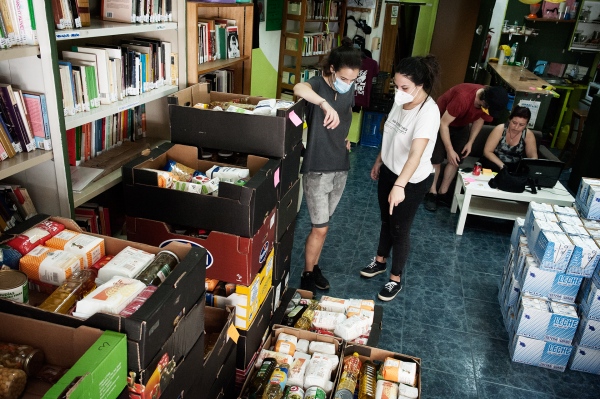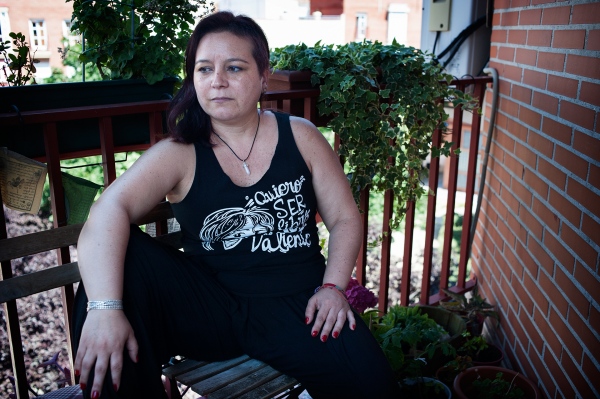
“I am not afraid to say that I work in black, let's see I have colleagues who are Spanish and who work in black too. The submerged economy in Spain is impressive because many employers do not want to pay social security…. Now I am asking for papers, based on my social roots here and showing that there is an employer who wants to hire me. But you can do this only after having lived in Spain for 3 years. Living here for three years without papers allows you to launch the procedure. But how you lived during these three years and with what money, nobody asks you. And tell me, who comes to Spain with enough savings to live for so long? In such a system, it is normal for people to work in black."
Andrea
ANDREA
(43 years old, Chile)
user and member of LA BRECHA
self-managed socio-cultural center with solidarity pantry
Andrea left Chile in 2014, with her partner and her daughter, who was barely 1 and a half year old at the time. In Chile she finished two careers: one in Civil Engineering and the other in Mining Engineering and worked in Mining Engineering afterwards.
“I wanted to study theater but my mother told me: first study something that gives you money, and that's how I ended up studying engineering. I am a daughter of a single mother. I was doing quite well in Chile but I don't like the way things work there. Let's see, I worked 9 hours a day, my job was one hour from home so I was away from home at least 11 hours. That meant my daughter had to spend this time in nursery school. I had someone to help me with cleaning at home and with my daughter, but I did not see my daughter. My partner worked in a bank with the same hours as me and on weekends the only thing we used to do was to watch a movie because you ended up exhausted and tired. We had no life; we had money but no life. I didn't see any sense in it.”
Se always liked Europe and knew that at some point she was going to come here. They went first to Manchester, with the idea of spending 6 months of intense courses to learn the language, but the final destination was Spain.
“We decided to come to Spain mainly because here it is much easier than in the UK, in a sense, before you can apply for papers, in Spain you can work in black. Spain is much more permissive with this. In England you cannot work in black or it is very difficult and at the paper level, at least for Chileans, it is almost impossible to obtain resident permission. I am white, unfortunately racism works in my favor, and here in Spain I pass as if I was Spanish, so I was never afraid police would catch me on the street. My strong point also is that I have a very good education, and I also have a very high level of English, which in Spain is not very common. Between one thing and another, since I came here, even without papers, I never had a problem finding a job. Let's see, we talk about work that sucks, with bad conditions, without security, but I always had it.”
Spain is one of the countries that top the European Union lists in terms of the importance of the underground economy. Apart from all the negative consequences that the lack of regularization has, in this pandemic, in addition, people who are forced to work in black were left without resources or the possibility of requesting aid.
“Before the pandemic, I worked in a hotel, as a night receptionist. During the day nobody wants to put you on because there are inspections, but at night there is no problem. My employer already wanted to contract me legally, but the pandemic hit and he had to close the establishment. All my colleagues from work went to ERTE* but since I had no papers, I was left with nothing. I had to live on my savings, because I had no job, no right to unemployment, nothing. Luckily my expenses are not very high - I share my flat with my sister and another woman. I could also get food in the La Brecha**solidarity pantry, a self-managed socio-cultural center, of which I have been a member for years. I was also helped by the companions of a feminist group Lobas, I was always very involved in this type of movement and, finally, in case of problems, it is this type of network that saves you. The people are very supportive. Some when they were coming to the center even used to bring me dishes already cooked. But my savings are over now, I don't even want to think what will happen if this situation repeats.”
The pandemic showed even more strongly the need for regularization for all these people who work in Spain in the underground economy. At the administrative level they are forced to live in limbo and on the margins of society and in case of problems they cannot ask for any institutional help or support.
“I don't understand the Immigration Law here, because in reality it almost forces you to work in black. When I arrived, I had no problem opening a bank account, renting the apartment, finding a job, but for the system 5 years later I am still invisible and it is not because I like this situation, but it is difficult to find someone who will be willing to make the legal contract and help you to regularize your situation. I think what they should do when you arrive, is give you a permit for 6 months, for example, if you find a job during this time, your permit would be extend, if you do not, you would have to leave. This would work much better and there would not be as much underground economy as it is a case now.
There are other things that make me very angry. For example, in the immigration offices they do not give you all the information and thus they force you to hire a lawyer, which is normally not mandatory but when you start the whole procedure they make it so difficult that you have no other choice. There are even companies, in call centers, that are dedicated to getting you an appointment with immigration office for money; something you normally should be able to obtain for free. All this is a succulent business after all.”
The problem with obtaining appointment at the immigration offices soared even higher during the pandemic. Many people, who were already in the regularization process, were left in limbo because most of the procedures were stopped. Already existing mafias were reinforced asking about €60 to make an appointment. On the other hand, volunteers also appeared who dedicated their computer resources and hours to make appointments with immigrants who did not always have access to the Internet and computer.
“What will come out of this pandemic: I think the rich are going to get richer, and the poor are going to get poorer. This, on the one hand; and on the other, I have hope that everything we have just experienced will make people reflect. That we cannot continue like this, that we have to understand that we are together in it, and not each on their ow.
*ERTE - Temporary Employment Regulation - is a measure approved by the government in Spain during the pandemic to protect jobs from layoffs.
**To learn more about the center and / or support the solidarity pantry enter here: LA BRECHA


